Rosacea and Rhinophyma
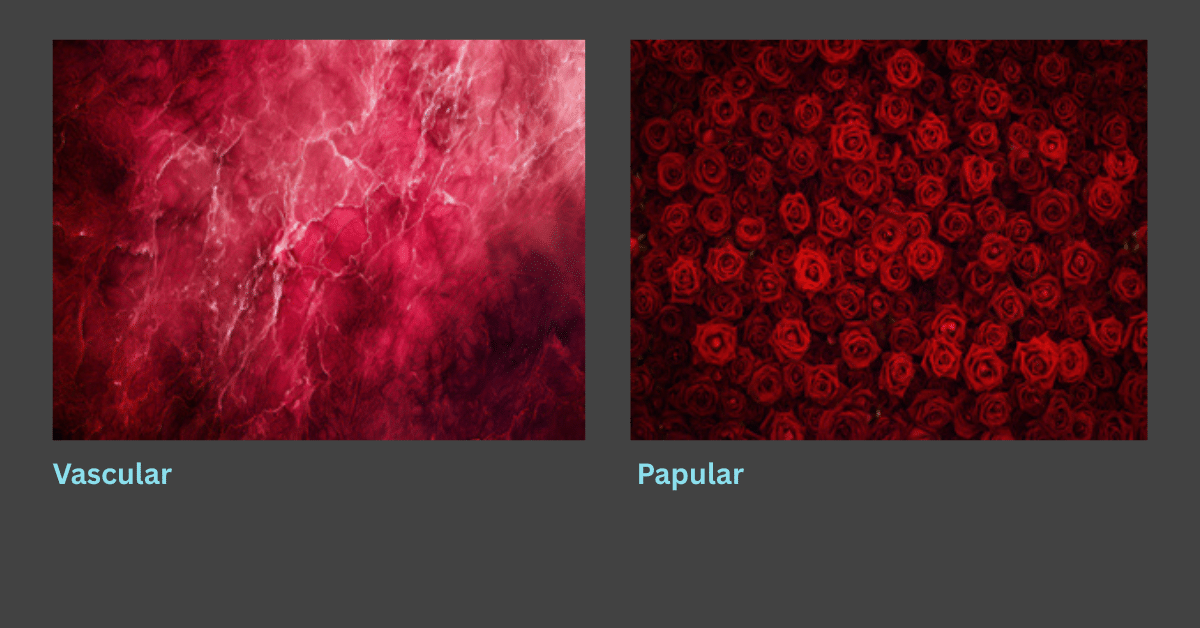
SMCC Rosacea Clinic
Rosacea is a common yet often misunderstood skin condition that affects many individuals, particularly those with fair skin. Characterized by facial redness, flushing, visible blood vessels, and sometimes acne-like breakouts, rosacea can significantly impact a person’s self-esteem and quality of life.
Solihull Medical Cosmetic Clinic under the supervision of Dr Sagoo is one of leading specialist cosmetic clinics in the UK at the forefront of rosacea treatments with an extensive range of laser treatments for this distressing condition. We regularly receive referrals from GP’s plastic surgeons and dermatologists and carry out several hundred treatments a year seeing patients from all over UK. We also see many patients that have not had correct treatments from other clinics as they have been treated with the wrong devices.
Meet the team at our Rosacea Acne Treatment clinic
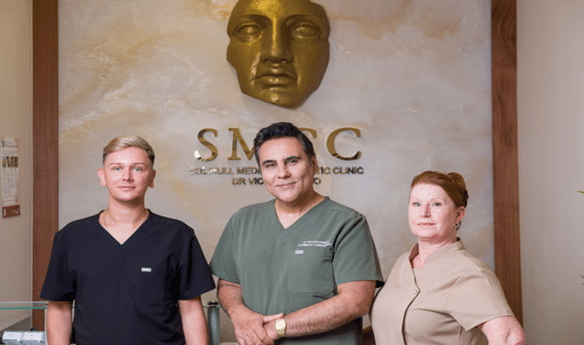
Why We are the Leading Clinic For Rosacea Treatment in the UK
- We have invested half a million pounds and only use the best medical grade laser treatments in the world which aim to target redness at a deeper level, which may dramatically reduce redness and improve pore size and
- Dr Sagoo has decades of experience treating rosacea patients and has so far treated thousands of rosacea sufferers as a GP and a cosmetic doctor over 20 years with specially modified protocols through his experience.
- We understand the psychological effects of Rosacea and living with the condition. With many years of experience in Rosacea treatments, Dr Sagoo truly understands the psychological effects of the condition and how it can affect a sufferer’s confidence we do not just treat the condition but look at the person holistically looking at diet, lifestyle and psychological aspects.
- We regularly receive many referrals from local GPs and dermatologists to our clinic.
- Many people come to us as a last resort thinking that there is no effective treatment out there. We work as a team, with our clients and monitor and review regularly as the treatment progresses.
- Dr Sagoo is a well-known experienced GP and can prescribe topical creams and gels as well as oral antibiotics, which evidence has shown to be effective for some patients. After a full medical history, we sometimes prescribe medications, as the client’s own GP may not be willing to and create bespoke rosacea treatment plans specific to the individual.
- We also focus on the trigger factors of rosacea and try to inform and educate our clients on lifestyle and diet factors.
- We are Care Quality Commission (CQC) registered and inspected for last 18 years ensuring that we are meeting quality service of excellence for our patients.
Lasers We Use for Rosacea
The clinic has invested over half a million pounds in the best lasers in the world to comprehensively treat this condition. With a whole range of different treatments, ranging from prescription medications and antibiotics and medical grade rosacea skin care products prescribed by Dr Sagoo following assessment to combining several lasers including:
- Medical-grade IPL (intense pulsed light) targets flushing redness
- Pulse Dye laser for more resistant rosacea to dramatically reduce redness after a few treatments
- We combine Nd Yag lasers to improve texture and pore size and combine with acne lasers to target the sebaceous (oil producing glands as well as treating the acne bacteria that is associated with acne/rosacea.
- For moderate-severe rosacea we use a specific non ablative erbium Yag laser, which deeply penetrates skin causing thermal damage directly to the sebaceous glands reducing oil and sebum. This laser and may also improve the hyperplasia (overgrowth) of sebaceous (sweat) glands around the nose and cheeks as well as destroying the associated acne bacterial infection.
- Nd Yag vascular laser to treat and destroy the thread veins and dilated blood vessels
- Fully ablative C02 laser resurfacing to treat the severe form of rosacea called rhinophyma to the nose area.
- LED low intensity laser light to reduce flare ups and rejuvenate the skin.
In total we have 7 world class lasers to treat all grades of Rosacea, this is more than any other clinic in the UK.
What Causes Rosacea?
The cause of rosacea has not been determined. It may be a combination of hereditary and environmental factors. It is known that some things may make your symptoms worse. These include:
-
- Eating spicy foods.
- Drinking alcoholic beverages.
- Having the intestinal bacteria Helicobacter pylori.
- A skin mite called demodex and the bacterium it carries, Bacillus oleronius.
- The presence of cathelicidin (a protein that protects the skin from infection)
Rosacea Risk Factors
There are some factors that will make you more likely to develop rosacea than others. It often develops in people between the ages of 30 and 50. It is also more common in people who are fair-skinned and have blond hair and blue eyes.
There are also genetic links. You are more likely to develop rosacea if you have a family history of the condition or if you have Celtic or Scandinavian ancestors. Women are also more likely to develop the condition than men. However, men who develop the condition often have more severe symptoms.
Understanding The Types Of Rosacea
Rosacea is categorised into different subtypes:

Erythematotelangiectatic rosacea (redness and visible blood vessels)

Papulopustular rosacea (red bumps and pimples)
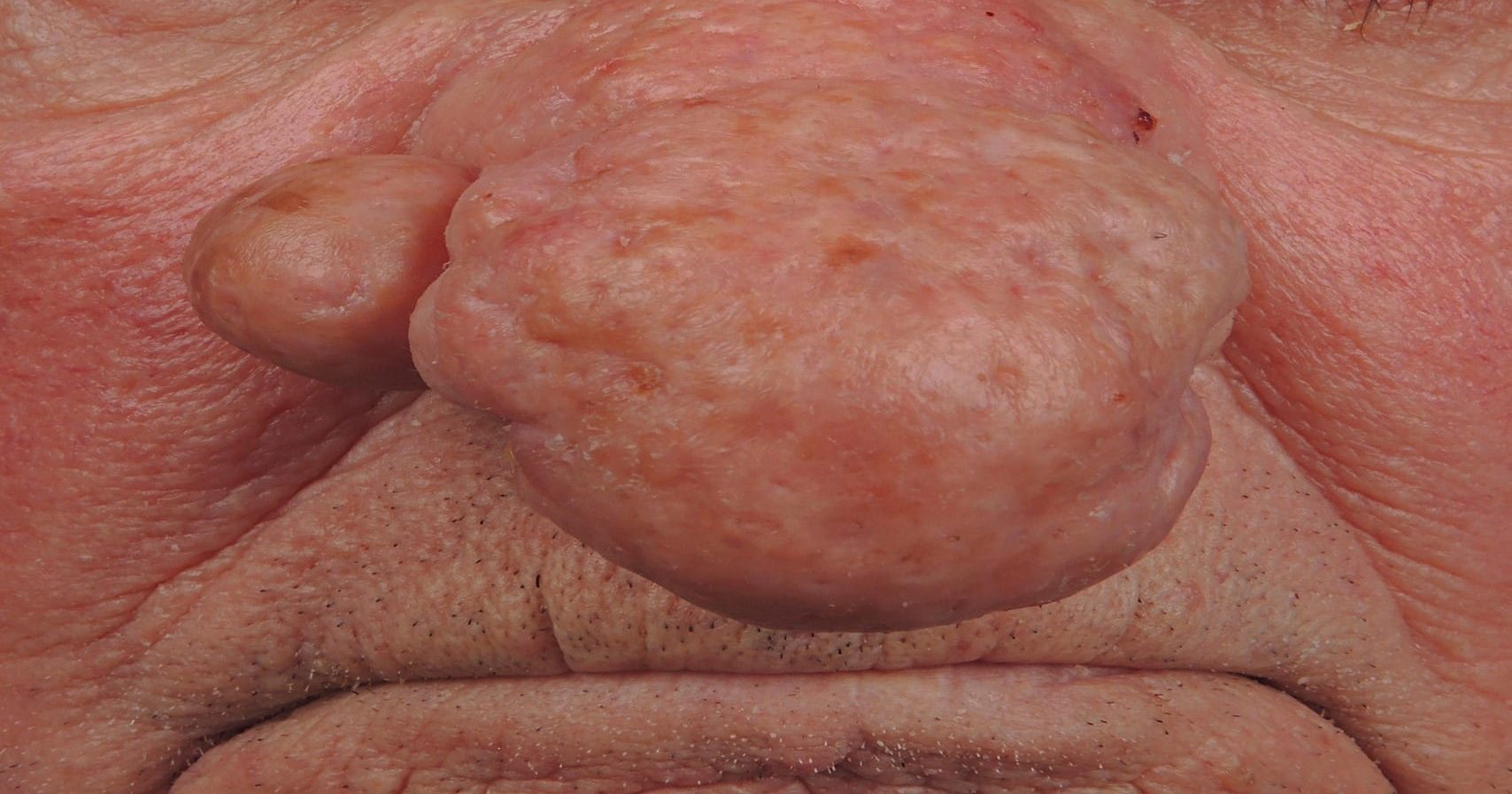
Rhinophyma rosacea (thickened skin), and ocular rosacea (eye irritation)
Symptoms of Rosacea
Rosacea symptoms are different between each subtype.
Signs of ETR: (Grade 1)
- Flushing and redness in the centre of your face.
- Visibly broken blood vessels.
- Swollen skin.
- Sensitive skin.
- Stinging and burning skin.
- Dry, rough, and scaly skin.
Signs of Acne-Rosacea: (Grade 2)
- Acne-like breakouts and very red skin.
- Oily skin.
- Sensitive skin.
- Broken blood vessels that are visible.
- Raised patches of skin.
Signs of Thickening Skin: (Grade3)
- Bumpy skin texture.
- Thick skin on the nose.
- Thick skin on chin, forehead, cheeks, and ears.
- Large pores.
Understanding these subtypes helps in tailoring treatment approaches.
Rosacea Triggers
It is important identifying individual triggers that can exacerbate rosacea symptoms. Common triggers include sun exposure, extreme temperatures, spicy foods, alcohol consumption, and emotional stress. Patients are encouraged to keep a diary to track flare-ups and their potential causes.
Rosacea Treatment Options
At our clinic following an in depth assessment with Dr Sagoo we take several images using Visia skin analysis images to identify the type of rosacea at different levels of the skin create a bespoke programme of treatment together with regular reviews to control and manage the condition.
We may carry out one type of treatment or combine several different treatments to manage the condition from aspects which may include oral antibiotics, skincare a combination of lasers to address the specific aspect of the condition working together to achieve a common goal of clearer skin and improve self confidence.

Thermal imaging skin images to assess the severity of rosacea using Visia Skin analysis.
- Topical and Oral Medications:
The Rosacea Association UK recommend the use of topical treatments, such as metronidazole or azelaic acid, to reduce inflammation and redness. For more severe cases, oral antibiotics like doxycycline may be prescribed to help control the inflammatory aspects of the condition. Dr Sagoo may prescribe all these medications to supplement the other treatments that we offer.
- Laser and Light Therapies:
- Intense Pulsed Light (IPL): IPL therapy is commonly used to treat flushing and visible blood vessels, providing a broader spectrum of treatment.
- Nd:YAG Laser: This treatment is effective for deeper redness and larger blood vessels and tighten pore size.

We treat the dilated blood capillaries (thread veins) associated with rosacea using a powerful vascular Nd Yag laser, which aims to destroy the vessels by thermocoagulation.
- In more resistant cases we may use pulse dye laser to destroy the blood vessels causing the redness.
- We use non ablative Erbium Yag laser which can shrink the oil producing glands and destroy the acne bacteria that contribute to the infection. The wavelength of light energy 1540 nm is ideal to achieve this
- Pulse dye laser is considered gold standard for destroying resistant vessels not responding to IPL treatment although there may be a down time with each treatment.
- Fractional C02 laser can improve skin texture and also in fully ablative mode can remove excess sebaceous skin as associated with rhinophyma.
- Vascular Nd Yag laser to treat and destroy reticular and fine thread veins that contribute to the redness.
- LED low level intensity laser can calm inflammation down and reduce flare ups as well as rejuvenating the skin using 2 different wavelengths.
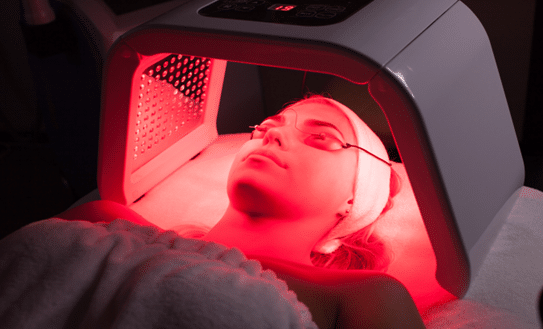
Dermalux LED Laser Light Therapy
- Skin Care Regimens:
It is important to stress the importance of using gentle, non-irritating skincare products. Patients are advised to avoid harsh scrubs and abrasive ingredients that can aggravate their skin. Sunscreen is also emphasized as a crucial part of daily skincare to protect sensitive skin from UV damage.
The clinic uses a range of medical grade rosacea specific skin care products on nearly all our rosacea patients which after a few days usage calms the irritation and soreness of the skin as well as moisturising and diminishing the redness. They contain potent anti inflammatory ingredients to reduce inflammation rapidly.
The patients are shown how to use the skincare products at home so now they can control the condition in their everyday life between treatments. We may also carry out gentle peels as well as hydrofacial dermabrasion to exfoliate and unblock clogged pores.
Long-Term Rosacea Management
Ongoing Care: Rosacea is a chronic condition that requires long-term management. Regular reviews can help monitor the condition and adjust treatments as needed. We review our rosacea patients regularly throughout the year. Most of our patients have been with us for years forging close partnerships on managing their skin through flare ups.
By combining medical treatments with personalised skincare regimens and lifestyle adjustments, patients can achieve significant improvements in both skin appearance and overall quality of life.
If you have rosacea or are struggling with its management, please contact our rosacea clinic for an in depth consultation and assessment so we can develop an effective treatment plan tailored to your needs.
Rosacea Treatment Gallery
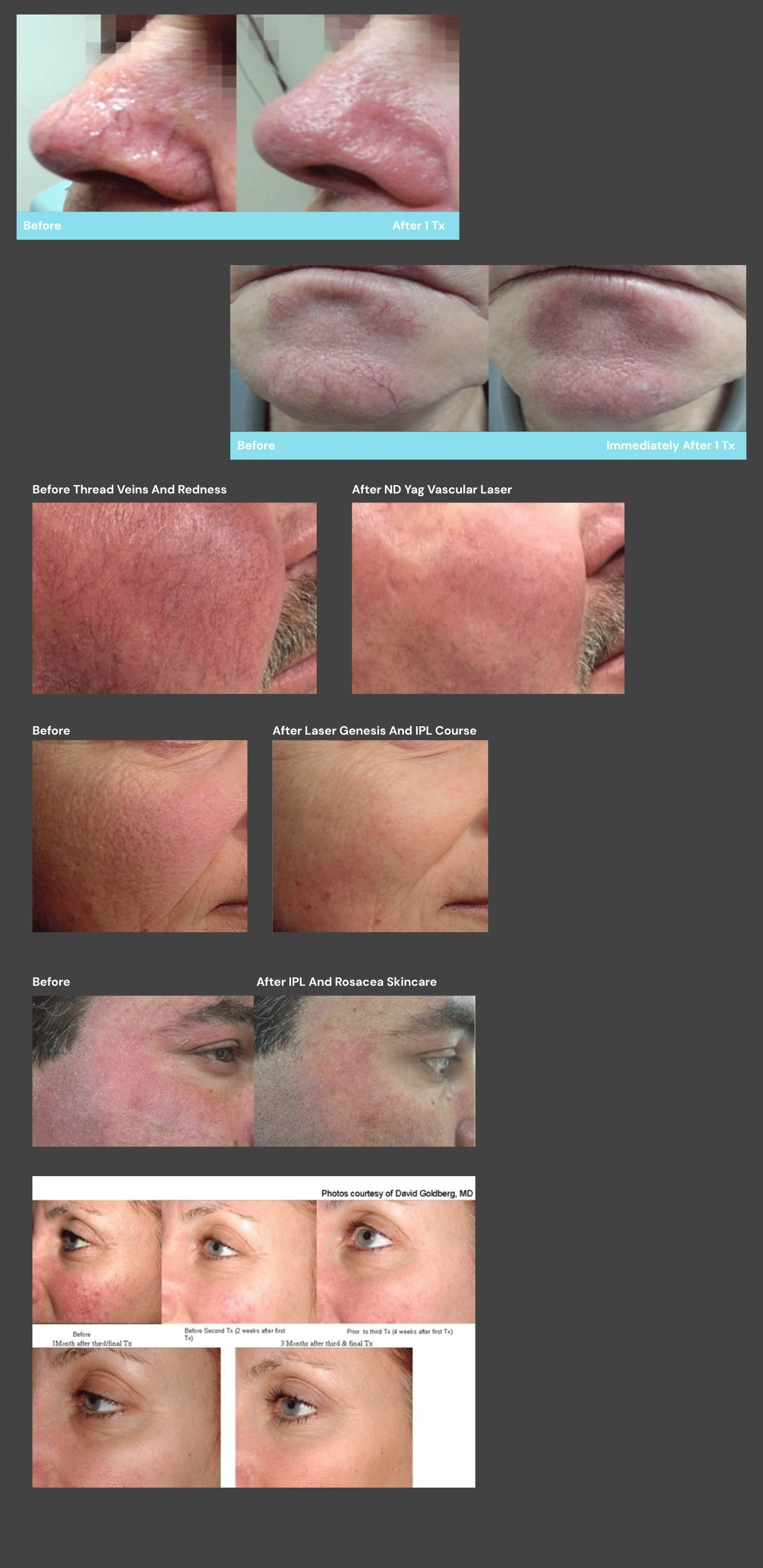
What is Rhinophyma?
Rhinophyma is a condition characterised by thickening and enlargement of the nose, leading to a bulbous appearance. It is considered a severe form of rosacea and typically develops over time, often affecting middle-aged men more than women. Rhinophyma often occurs as a progression of untreated or poorly managed rosacea. The persistent inflammation and dilation of blood vessels in rosacea can lead to changes in the skin’s structure over time. The exact cause of rhinophyma is not fully understood, but several factors are believed to contribute to its development:
While rhinophyma is primarily associated with chronic rosacea, its exact causes involve a combination of genetic, environmental, lifestyle and physiological factors. Early diagnosis and management of rosacea can help prevent the progression to rhinophyma.

Rhinophyma
Rhinophyma is a condition that can severely affect a persons confidence and affect them mentally. The condition is not really treated under the NHS and waiting lists can be long and people seek to have surgical/laser removal privately as the delay can make the condition worse if left untreated.
Not knowing where to go to find a specialist clinic to treat this problem is difficult unless you have the correct laser devices.
Clinical studies that 2 particular lasers are very effective in removing the hard thickened tissue and improving the texture.
We use the most powerful Co2 laser in the world, the Ultrapulse ablative C02 SCAAR FX also used for treating burns and severe scars. We are one of 3 clinics in UK that have this laser to debulk and cut thickened skin tissue of the rhinophyma. Dr Sagoo has had years of training using these specialist medical grade lasers. We also combine with the Erbium Yag resurfacing laser to improve texture and pore size which is carried out 6 weeks after the first session. These are specialist medical grade lasers that are really only found in the major burns and trauma centres in the UK and we have both as a medical specialist laser clinic. The procedures may be carried out between one and two sessions dependent on the severity.

After 1 Session of Co2 Laser Ablation
For a detailed consultation and assessment by Dr Sagoo at the SMCC Rosacea Clinic, please contact us at tel: 03300 417494 or fill in an online contact form.
